Summer Reading List: 5 Books for Leaders
Latest Posts
- 2024 Reading List for Leaders
(posted: 07/01/2024)The right book can be a leadership game-changer.
- Coach's Notebook: Exec Presence for Leaders
(posted: 05/08/2024)As a leader your charisma is critical. Learn how to develop it!
- New Year's Resolutions vs New Chapters
(posted: 02/01/2024)Forget New Year's...Your new chapter can begin when you are ready!
Blog Archives
Kristi posts to her site about once a month, but frequently more often. She also appears as a featured contributer on select other sites. If you would like to be notified when new blogs are posted, please subscribe to our newsletter.
If you are interested in Kristi guest posting to your site feel free to contact us.
Summer Reading List: 5 Books for Leaders
(posted: June 17th, 2019)

[All links in this post are provided as a courtesy to the reader. The reviews are my own opinions, all of the books were purchased, and I do not receive any kind of compensation if you click on a link!]
Successful leaders, and successful people in general, are readers.
Reading can help fight depression, make you more confident, and a better decision maker. Reading is a great way to acquire new information, come up with creative ideas, and learn worthwhile tips that can improve your personal and professional life. Is it any wonder some of the world's biggest business leaders are avid readers?
Steve Jobs had an apparently inexhaustible interest in William Blake. Nike founder Phil Knight so reveres his library that you have to take off your shoes and bow when entering it. Bill Gates reads roughly 50 books per year and puts together his own summer reading list.
This year, my Summer Reading List for Leaders has a slightly different focus. With my daughter graduating from high school, I found myself thinking about the book list in terms of what we all need to succeed in life. Which books do I consider timeless, with ideas and concepts that are useful no matter how much the world changes? Which would I give to my daughter as she begins her adult journey, and also offer to you?
Most of the books I chose this time are not directly about leadership. Instead, they focus more on what kind of person, or what kind of leader, you want to be.
I've also included a bonus, just-for-fun, "beach read" at the end!
Leaders: 5 Books for Your Summer Reading List, +1
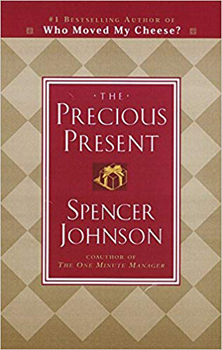 1) Precious Present, by Spencer Johnson
1) Precious Present, by Spencer Johnson
What it's about: By the same author who wrote The One Minute Manager and Who Moved My Cheese, the Precious Present is a short, beautiful tale about appreciating this very moment.
It's the kind of book you re-read, and that you find yourself giving to everyone you can think of.
In fact, my first copy was given to me by my wonderful father, who I admire immensely, with a very special note inside that includes, "May your life be fulfilling with the precious present, always."
What you'll learn: Big concepts fill up this little book!
Gratitude and love for life. Being conscious of everything going on around you, helping you to bring out the best in yourself and others.
- The precious present has nothing to do with wishing
- When you have the precious present you will be content to be where you are
- The wealth of the present comes only from itself
- The precious present is not something that someone gives you, it is a gift you give yourself
- I can choose to be happy now or I can try to be happy when … or if….
- The present is simply who I am, just the way I am, and it is precious.
This book contains life lessons that you may already know, but it's still nice to revisit them. Good for a new graduate, or for anyone you know who needs a little pick-me-up.
2) Big Potential: How Transforming the Pursuit of Success Raises Our Achievement, Happiness, and Well-Being, by Shawn Achor
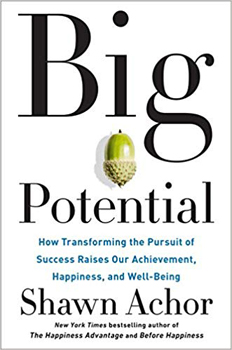
What it's about: Just as happiness is contagious, every dimension of human potential - performance, intelligence, creativity, leadership ability and health - is influenced by those around us. So when we help others become better, we reach new levels of potential, as well. Sean Achor, author of The Happiness Advantage, uses a combination of research, personal anecdotes, and positive strategies to provide a new path to thriving in the modern world.
What you'll learn: Small Potential is the limited success we can attain alone. BIG Potential is what we can achieve together. Achor gives us five strategies; the "SEEDS" of Big Potential, to increase our ability to achieve while also bringing happiness and meaning back into our lives. In the workplace we need other people to inspire us and coax out our creativity. Big potential isn't about trying to go faster alone. It's about working to become better together.
This is going to sound heretical in our individualistic, highly competitive culture, but Achor says, and I agree, "We need to focus not on breeding high performing individuals who will compete with one another, but on helping to make the group collectively better."
The key to real leadership is inspiring others to be leaders. The key to good parenting, and strong relationships, is helping to bring out the best in the people we love. The key to true happiness is finding joy in helping others become happier. And the key to achieving your highest potential starts by helping others achieve theirs. It all starts by asking the bigger questions:
- How do I expand my influence in an interconnected world?
- How am I impacting others with my life and my energy?
- How do I raise my potential by making others better?
3) Go Giver: A Little Story About a Powerful Business Idea, by Bob Burg and John David Mann.
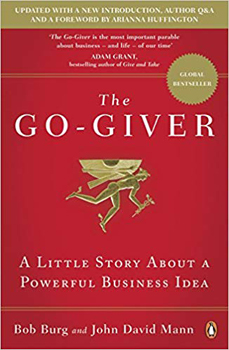
What it's about: Here's another one that's been around a while, illustrating the proverb, "Give, and you shall receive." Following an ambitious young man, we learn with him that changing his focus from getting to giving - putting others' interests first and continually adding value to their lives - ultimately leads to unexpected returns.
What you'll learn: The 5 Laws of Success
1. The law of value: your true worth is determined by how much more you give in value than you take in payment
2. The law of compensation: your income is determined by how many people you serve and how well you serve them. It is directly proportional to how many lives you touch.
3. The law of influence: your influence is determined by how abundantly you place other people's interests first.
4. The law of authenticity: the most valuable gift you have to offer is yourself.
5. The law of receptivity: the key to effective giving is to stay open to receiving.
It's true about conflict and it is true about everything. Go looking for conflict and you'll find it. Expect people to take advantage of you, and they generally will. See the world as a dog eat dog place, and you'll always find a bigger dog looking at you as if you're his next meal. Go looking for the best in people, and you'll be amazed at how much talent, ingenuity, empathy and good will you'll find.
Ultimately the world treats you more or less the way you expect to be treated.
4) The Advantage: Why Organizational Health Trumps Everything Else In Business, by Patrick Lencioni
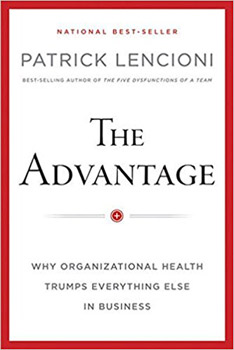
What it's about: This is one of those evergreen books that belongs in every leader's library. I pulled it out recently and re-read it in preparation for attending Pat Lencioni's first public seminar. In the book, and throughout his work, Lencioni argues that business success has everything to do with the health of the organization. In his words, "I have become absolutely convinced that the seminal difference between successful companies and mediocre or unsuccessful ones has little, if anything, to do with what they know or how smart they are: it has everything to do with how healthy they are."
What you'll learn: A healthy organization is one that has pretty much eliminated politics and confusion from its environment. As a result, productivity and morale soar, and good people almost never leave. That's pretty compelling, but it is undeniably hard, too. It requires work and discipline, though elements of it can become habit over time.
Lencioni identifies four broad disciplines that act as the foundations of organizational health. Well, one, and then three related ones: Building a cohesive leadership team, creating clarity, over-communicating that clarity once the leaders have a good grasp of it, and reinforcing clarity by ensuring that the people processes are designed to support the uniqueness of the organization.
This isn't just theory, either. The book is filled with exercises and practical suggestions so that you know what you need to do to build a healthy organization. The seminar was a wonderful way to enhance and reinforce the ideas in the book.
5) 10% Happier: How I Tamed the Voice in My Head, Reduced Stress Without Losing My Edge, and Found Self-Help That Actually Works--A True Story, by Dan Harris
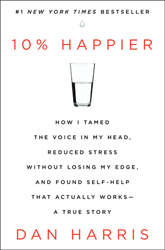
What it's about: Is the voice in your head a jerk? Mine is, and so is Dan Harris'. The co-anchor of Nightline and the weekend Good Morning America, Harris is smart, funny and skeptical about anything "New Age-y". His book takes you along on his strange adventure, from his nationally-televised panic attack to his journey through the weird world of alternative spirituality, and finally into meditation. It's a great read, from a master storyteller, and it also provides a real starting point for skeptical, impatient, driven types (me, you?) to try meditation.
What you'll learn: Perhaps one of the greatest things about Harris' book is that if he can meditate, anyone can. By now we've all see the research on how meditation can help us to be more successful, in our businesses as well as in our personal lives, but many of us still think that it's "not for us" or that we simply can't do it. Harris takes us inside his mind and shares his thoughts and behaviors to let us see that we are not alone. He too is driven, ambitious and practical, yet he finds that he can meditate, and that it does improve his life, his relationships, and his decision-making.
Mindfulness is the ability to recognize what's happening in your mind right now; anger, jealously, sadness, the pain of a stubbed toe, without getting carried away by it. It represents an alternative to living reactively. I find that I see life’s in-between moments, sitting at red lights, waiting for people, as a chance to focus on my breath or just take in my surroundings. Picture the mind like a waterfall. The water is the torrent of thoughts and emotions; mindfulness is the space behind the waterfall.
The book title, 10% Happier, is a reference to Harris' estimate of how much mediation has changed him. He's quite clear that meditation is not a miracle cure. Yes, meditation sounds weird at first, and yes, it is hard. In fact, one of the a-hah's here is that meditation doesn't necessarily get easier, that your mind will wander and you will struggle to focus. That simply is the practice, and it is worth it.
For those of you who want to try it, I highly recommend trying Headspace. It gives you some guidance and structure and lets you try different kinds of meditations.
Bonus Book - Cemetery Road, by Greg Iles
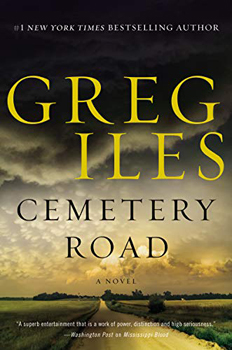
This is a true "beach read". It's the latest release from the New York Times bestselling author of the Natchez Burning trilogy. ANYTHING from this author you just can't put down. He's a master of suspense, with storytelling that pulls you in and doesn't let you go.
Cemetery Road is an absorbing crime story and an in-depth exploration of friendship, grief, betrayal and corruption. The protagonist is a successful journalist in Washington, DC, though the majority of the story takes place in a small Mississippi town.
I don't want to give anything away, but the book has action, mystery, suspense, AND character development.
Take this one on a long flight, or literally read it at the beach or by the swimming pool this summer and allow your mind to disengage from the rest of your life.
Note that reading fiction can have some unique benefits, including stress reduction, building empathy, enhancing creativity, improving memory, and making us more tolerant and open-minded.
Personal Development IS Leadership Development
This year’s book list was focused on personal development, but I should point out that most of these books include best practices that I use in my work with clients regularly. That includes executives and even teams. After all, building your skills and abilities as a person informs who you are as a leader, and all of us individuals come together to make up teams!
Of course, if you are hungry for more great reads, drop me a line. I have many more suggestions and I am always thrilled to share.
- Have you read any of the books on this year's list? If so, please share your thoughts in the comments.
- Which one book on this list sounds most interesting to you?
- What title would you add to the list?
- What else is on your reading list this summer?
